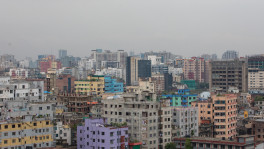A time to rise above everything
Chattogram-based Mostafa Hakim group shows the way to responsible capitalism

It was the best of times, it was the worst of times, Charles Dickens wrote in the opening passage of A Tale of Two Cities. The sentiment would most likely be shared by people when they look back at the novel coronavirus pandemic.
There are companies exploiting human helplessness up to the hilt, and then there are those that are going out of their way to help people in need. And Chattogram-based Mostafa Hakim group falls in the latter category.
At a time when questions about brand ethics are resonating everywhere, the 55-year-old company has risen to the occasion.
The company, which deals with a diverse range of products and services, is giving away 80 percent of the oxygen produced at its Golden Oxygen plant – one of its 12 concerns – to Covid-19 patients.
At some point, many Covid-19 patients develop a strong case of pneumonia that deprives their blood of oxygen. Normal oxygen saturation levels are 95 percent or more. When it drops below this mark, supplemental oxygen needs to be administered to the patient, whose condition may not be bad enough to be put on a ventilator.
And that is where the oxygen tanks come into play.
The gas is held under pressure in cylinders or as liquid oxygen. The storage vessels are connected to an oxygen mask or nasal cannula.

Due to its portability and simplicity, the medical equipment has become absolutely essential for treating Covid-19 patients as opposed to sophisticated and costlier alternatives – oxygen concentrators and ventilators.
As coronavirus infections escalated in multiples since the first confirmed cases on March 8, the demand for oxygen tanks raced ahead at a pace never witnessed before, leaving the producers of the medical gas gasping for air.
The law of demand and supply took hold and price of oxygen tanks have reportedly tripled from its regular rate of about Tk12,000 since the pandemic first hit Bangladesh.
Like in other parts of the country, the port city was also facing a scarcity of oxygen tanks from April.
And this prompted the Mostafa Hakim group to import 1,000 cylinders from China in May for Tk1.1 crore.
"We imported half the cylinders by air and the rest through sea," Mohammad Sarwar Alam, a director of Mostafa Hakim group, told The Business Standard.
Given their hefty weight, importing cylinders by air was a costly exercise.
"So, we brought in about 500 cylinders this way and tried to solve the crisis on an emergency basis."
The cylinders reached Dhaka from China in three days. But to get to Mostafa Hakim group, it took another 10-11 days.

The customs procedures at the Hazrat Shahjalal International Airport took 10 days, according to Alam, the grandson of Abdul Hakim, who initiated Mostafa Hakim group as a construction firm in 1965.
The oxygen tanks were distributed in 41 wards of the port city and the Sitakunda and Swandip upazilas to hospitals such as Chattogram General Hospital, Dampara Police Line Hospital, Holy Crescent Hospital, and some Covid-19 isolation centres in Chattogram – for free.
And the tanks, whose capacities range from 1.6 cubic litres to 9.6 cubic litres, are refilled every day for nothing, costing the company – whose annual turnover is about Tk2,000 crore – Tk2 lakh a day.
Not just that, it has set up depots from where anyone can pick up an oxygen tank or get their existing ones refilled – on the house.
"We published advertisements in newspapers informing if anyone needs oxygen, they can contact our representatives or the nearest ward council offices."
The company kept 6-10 cylinders in each ward for emergency cases.
Mostafa Hakim's efforts went some way towards bottoming out the oxygen tank crisis in the port city in June.
"We will continue to provide free oxygen until the pandemic ends," Alam added.
Before the pandemic, oxygen generation at the Golden Oxygen plant was 3,000 cubic litres at most against a production capacity of 5,200 cubic litres.
Now, it is churning out 4,900 cubic litres of medical oxygen a day just for distribution on a complimentary basis, ignoring commercial sales.
The beneficiaries of this generosity in the port city, where 13,629 Covid-19 cases were recorded as of July 24, are beyond grateful.
"Had we needed to procure the oxygen from elsewhere, we would have had to spend quite a fortune," said Manowar Hossain, assistant director of Holy Crescent Hospital.
The medical institution on Zakir Hossain Road in Khulshi has 45 oxygen cylinders of 9.6 and 6.8 cubic litres, and 20 cylinders of 1.6 cubic litres, all of which get filled up every day on gratis.
"Golden Oxygen's help obviously saves many lives," said Ashim Kumar Nath, superintendent of Chattogram General Hospital.
The hospital needs 2,000 cubic litres of oxygen every day, which Mostafa Hakim provides.
As a result, the medical bill of a Covid-19 patient in the private hospital for six days is much less than Tk1 lakh, Nath said.

Mostafa Hakim's social conscience did not stop at the gratuitous distribution of medical oxygen only.
Its actions towards its 4,000 employees have not only been well meaning, but also well thought through.
Like almost every other company, Mostafa Hakim's revenues have plummeted 80 percent since the onset of the pandemic. But not once has it entertained the idea of slashing jobs or salaries, which sets the company back by Tk10 crore every month. It is also paying festival bonuses as it did in normal times.
If any employee falls prey to the coronavirus, the company arranges treatment. If anyone wants to work from home, it allows that, too.
For Eid-ul-Azha, the company has also arranged sacrificial animals for their workers in their respective districts, all to keep their spirits high.
"Not everything in life can be viewed from a business perspective. Our staff have been with us for a long time and we have a responsibility towards them too," said Alam, who joined the family business in 2010 after acquiring degrees in accounting and business studies from Australia.
The company – whose businesses include steel, ship breaking, cement, auto bricks, oxygen, real estate, liquefied petroleum gas, textiles, jute, and import and distribution trading – is expecting the economic slump to continue until the middle of next year.
Accordingly, it is doing its forecasting and budgeting, keeping its corporate social responsibility at the front and centre.
The company, which pivoted from a construction firm in 1981, has long been discreetly redrawing the relationship between business and society.
During the pandemic, it has distributed food to many families in Chattogram and northern districts like Bogura. For the past 25 years, it has been distributing iftar and sahur items to 40,000 families every year.
It has built mosques and graveyards for Muslims and temples and cremation grounds for Hindus.
Last week, it spent Tk20 lakh to rebuild the road leading to the Kattoli cremation ground as it was submerged and people taking the bodies for final rites were suffering.

Mostafa Hakim has set up two university-colleges, four high schools, five primary schools and 14 madrasahs in different parts of the country. About 10,000 youths are currently studying in the institutes. It also runs two charitable hospitals, four orphanages and an old-age home.
"We love to do something that will endure," added Alam, who is in his early forties.


 Keep updated, follow The Business Standard's Google news channel
Keep updated, follow The Business Standard's Google news channel
















